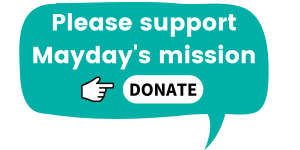Don’t criticise my work! Wait….is it MY work?
Mayday Trust Executive Assistant and Quality Manager, Ciara Killeen, gives an insight into the complex and vital relationship between policies and processes, and Mayday’s ability to be an entirely person led organisation.
I am Mayday’s Quality Manager. Yes, we have one.
It has been levelled at us, more than once, that we are a bit, well, ‘fluffy’. Part of my work as Quality Manager is to demonstrate how a quality system with policies and processes (I know I’ve said quality several times, stay with me, it does get better) can be person-centred and strength based. I find myself proclaiming that without a structure you cannot provide a truly personalised approach. Everyone would be working towards their idea of personalisation rather than an approach based on the principles people told us were important to them (Wisdom from the Street). We work with people during some of the most difficult transition periods of their lives – so providing quality and safety is key. So yes, we have a Quality Manager and quality systems which incorporate safeguarding and dynamic reviews of risk, as you would expect. It’s just that our systems are person and principle- led, not process led.
Being part of the PTS #OneTeam means that I am part of a very big team. As well as Mayday, I am very fortunate to work alongside our Innovation Partners. Together, we share the voices of the people we work with to positively challenge the power dynamics of processes so that we can move towards a PTS, person-led system.
A PTS and person-led system means we actively listen to people and our response is to share all of the options available, all of the processes they can utilise and all of the information we know so that people can make informed decisions. It means that our processes need to be flexible to allow for a personalised, creative solution within the process so that people can take what the PTS has to offer but use their power to make the right choice for them.
My role in all the brainstorming, developing and questioning, which happens regularly, is to take feedback and turn it in to…….something. It’s often the ‘something’ which is the tricky part! How can a process provide flexibility? What are essential elements and what can a Coach use their autonomy to change? How can we rebalance the power dynamics of this conversation/process to put the person in charge? How can you evaluate a concept, such as disruption, for the new PTS Accreditation? I spend hours roaming the office, chanting words such as ‘strength based!’ while I try to incorporate everyone’s feedback into a process which is flexible and person-led. It can lead people to think that I am eccentric!
As we are leading the systems change movement, we are often developing something completely new and unique. It can take a lot of creative thinking to develop the right tone, language and balance of power when you are also pioneering. There is often nothing I can compare our work to. It all develops from feedback and the PTS principles.
So, when I finally come to present to teams what I think is exactly what they told me was needed and no one is particularly happy with it or it requires yet another round of edits, it can feel….disheartening. It can seem personal; this is my work you are questioning! You can become defensive and even stubborn, ‘No way, I am not changing it again!’ And this is when my personal belief in the PTS principles come in to play.
My work is not about me. It does not belong to me. I am not trying to make myself happy nor am I doing this work on my own. It does not even belong to Coaches or the Senior Management Team. Whatever I am writing, whichever process we develop, it will eventually become part of someone’s unique PTS experience. It will belong to them in a completely personalised way. They will take ownership of it as we hand power back to people and ask them to utilise processes such as personal budgets or brokered opportunities in a way that works for them.
When we positively challenge each other, we are not saying ‘you are doing something wrong’; we are saying the current system/process/way of doing things is not working for people and as system changers, it is our duty to make sure every system works for the person who needs it.
Sometimes I do want to hide under the table when I receive a list of documents that need to be changed or I am asked to take a 10 page policy and make it into a 1 page statement. But then I remember the amount of unnecessary, personal questions on forms or the rigid policies which mean people have to take entry level courses in their degree subjects and I think, I am glad to work with people who challenge our systems to make sure we are person-led.


